You’ve tried the green smoothies, the 5 a.m. workouts, the stack of daily vitamins… and yet, somehow, you still feel tired, bloated, or just off. If you’re over 40 and feeling like your body isn’t responding the way it used to even when you’re doing all the “right” things you’re not alone. The truth is, many popular health trends weren’t designed with women in their 40s in mind. In this post, we’re cutting through the noise and talking about the habits you can finally quit and the simple, sustainable changes that actually make you feel better.
As we move through our 40s, our bodies change and so should the way we care for them. What worked in your 20s or 30s may no longer serve you now. The good news? You don’t need more rules or more restriction. You need smarter, simpler habits that actually support your energy, digestion, hormones, and peace of mind. So let’s talk about the seven trending health habits it’s finally time to let go of and what to replace them with for better results and less burnout.
1. Skipping Breakfast in the Name of Fasting
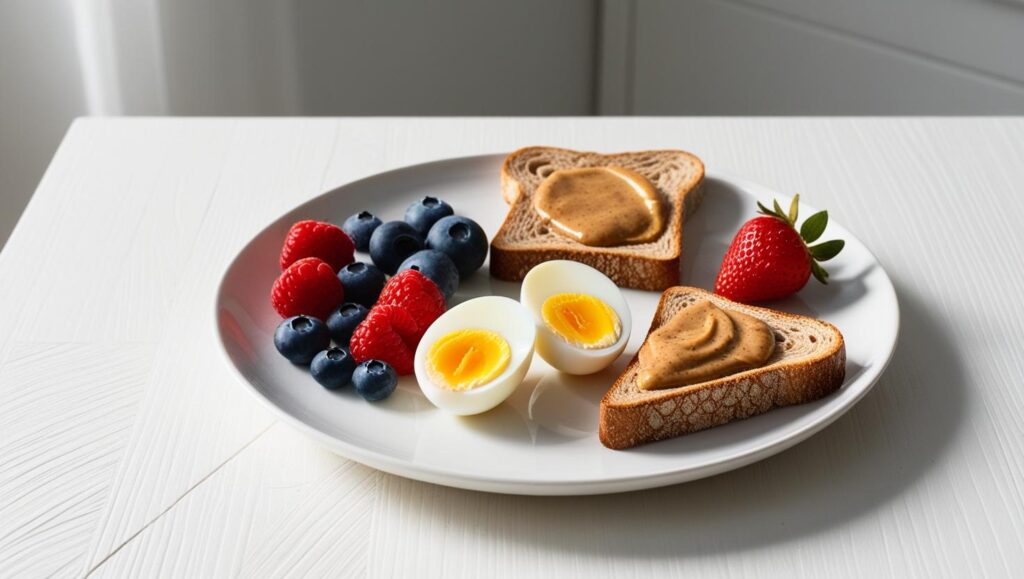
Intermittent fasting has taken over wellness spaces and for some people, it does offer benefits. But for women over 40, especially those dealing with hormone changes, it’s not always the magic solution it’s made out to be.
In fact, skipping breakfast can leave you feeling lightheaded, irritable, foggy, or overly hungry by mid-morning which often leads to overeating later in the day.
Your body at this stage is working harder to regulate hormones like cortisol, insulin, and estrogen. And when you deny it the fuel it needs early in the day, it can throw everything off balance — including your mood, energy, and digestion.
The Problem With Pushing Through Hunger
Cortisol Spikes Can Work Against You
In the morning, cortisol is already naturally higher. Skipping food during this time only adds more stress to your system. Over time, this can lead to fatigue, anxiety, and even weight retention — the opposite of what you might be fasting for.
Midlife Metabolism Needs Gentle Support
Your metabolism isn’t broken — but it does need consistency and nourishment. Long fasting windows can disrupt your natural rhythm and leave you feeling sluggish.
What to Do Instead Gentle Morning Fueling
Start Small, But Start Nourished
You don’t need to sit down to a full plate of eggs and toast the second you wake up. But starting your day with protein, fiber, and healthy fat within 1–2 hours of waking can do wonders. Think:
- A hard-boiled egg and a handful of berries
- A slice of sprouted grain toast with almond butter
- A scoop of collagen protein in your morning coffee or smoothie
Listen to Your Body’s Cues
Not everyone feels hungry the moment they wake up and that’s okay. But instead of ignoring hunger until noon, try honoring it gently. Your body is talking to you, not working against you.
The Benefits of a Nourishing Morning Routine
When you begin your day with steady fuel, you support:
- Better blood sugar regulation
- Stable energy through the afternoon
- Reduced cravings later in the day
- Less reliance on caffeine or snacks to “push through”
You also send a powerful message to your body: “You are safe, you are nourished, you are supported.”
There’s no need to fear food especially in the morning. If intermittent fasting feels more like a fight than a flow, it’s okay to let it go. A peaceful, protein-rich morning routine might be the one shift that brings your energy, mood, and digestion back into balance without the extremes.
2. Taking Too Many Supplements
When Wellness Becomes Overwhelming
It’s easy to think that loading up on supplements is the fastest way to feel better — especially when every scroll through social media shows someone taking a dozen different pills just to get through the day. For women over 40, though, this can turn into a quiet form of stress. More isn’t always better.

What Too Many Supplements Can Do to Your Body
Your body is more sensitive now than it was in your 20s. Hormonal changes, slower digestion, and shifting nutrient needs all play a role. When you start mixing vitamins, probiotics, adaptogens, collagen powders, and more — it can throw your gut off balance. You might feel bloated, foggy, or fatigued without realizing your supplement routine is part of the problem.
It’s also easy to forget that supplements are only effective if your body can actually absorb them — and when they’re stacked on top of each other, they can sometimes compete rather than support. Not to mention, swallowing a handful of pills first thing in the morning isn’t exactly enjoyable.
Simplify, Don’t Stack
Instead of chasing the next trendy product, try stepping back. Focus on a few essentials that truly make a difference for you — maybe something for digestion, for energy, and for immunity. That’s often enough. One high-quality supplement you actually take is better than ten that sit unopened.
And the truth is, the more complicated your routine becomes, the harder it is to stay consistent. The goal isn’t perfection — it’s progress. Choose what fits into your life. Choose what feels good, not what looks impressive on a shelf.
What Works Better for Real Life
When I simplified my supplement routine, I finally started to feel the difference. No more skipping days. No more wondering if anything was working. Just one simple step I could take every morning — something that supported my gut, my mood, and my energy without the stress.
If your daily routine feels like a chore, it’s okay to let some things go. Wellness doesn’t have to mean more products — sometimes, it just means less pressure.
3. Forcing Intense Workouts You Don’t Even Enjoy
Why Pushing Harder Isn’t Always the Answer
For years, we’ve been told that a “real” workout means sweat, soreness, and exhaustion. HIIT classes, boot camps, endless squats, early-morning spin rides — and if you’re not dripping in sweat, it doesn’t count, right?
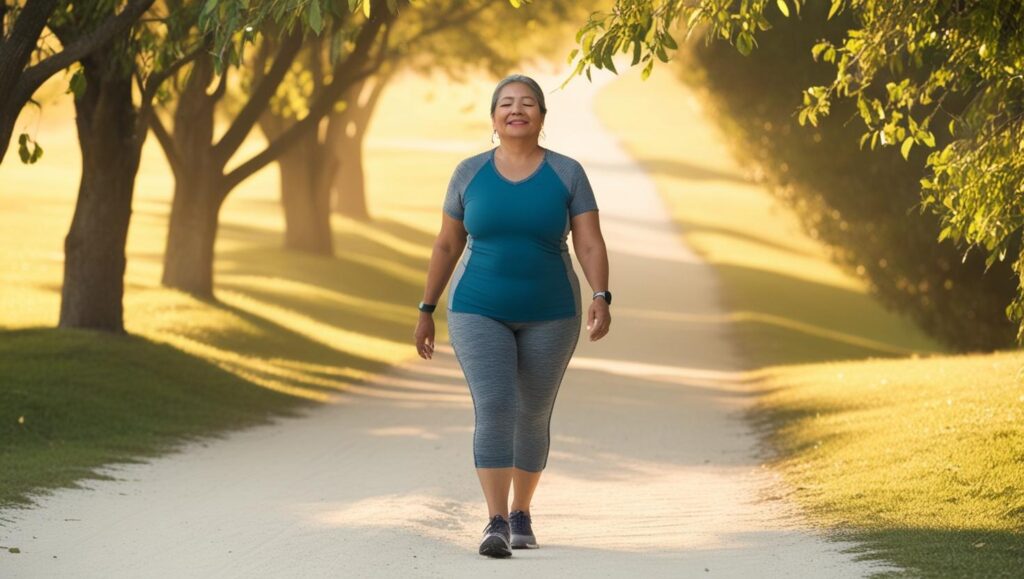
But if you’re over 40 and feeling drained after every workout — or worse, dreading them completely — it’s time to question whether this level of intensity is actually serving your body or just wearing it down.
The truth is, women in their 40s are in a unique phase of life. Hormonal shifts affect recovery, energy, and how your body responds to stress — including the physical stress of a tough workout. What used to feel empowering in your 30s may now leave you tired, achy, and burned out for the rest of the day.
Movement Should Support You — Not Punish You
There’s a big difference between challenging your body and pushing it past its limit. And for many women, the most effective fitness routine isn’t the most intense one — it’s the one they can do consistently and enjoyably.
If you’re constantly forcing yourself through workouts you secretly hate, you’re not building a lifestyle. You’re just building resistance. And eventually, you’ll stop — not because you failed, but because it was never the right fit for your season of life to begin with.
Try Gentle Movement with Real Impact
This doesn’t mean giving up on exercise. It means redefining it. Something as simple as a daily walk can offer powerful benefits — especially when paired with small upgrades like a weighted vest. Walking supports digestion, hormones, mental clarity, and cardiovascular health without the joint strain or pressure of more aggressive routines.
It’s free, it’s flexible, and most importantly, it’s sustainable. That’s the real win.
Other options like Pilates, yoga, stretching, and bodyweight training can also strengthen and tone without pushing your nervous system into overdrive. And if you still love a good workout class? Great — just tune into your energy levels, and give yourself permission to rest without guilt.
Make It Something You Look Forward To
The best form of movement is the one you enjoy enough to keep doing — not out of discipline, but out of genuine desire. For women over 40, working out should feel like a gift to your body, not a punishment for what you ate or how you look.
Let go of the “no pain, no gain” mentality. You’ve earned the right to move your body with respect and care — and still get powerful results.
4. Obsessing Over Drinking a Gallon of Water a Day
When Hydration Becomes Another Stress
We all know water is important. But somewhere along the way, the message of “stay hydrated” turned into “chug a gallon or more every single day — or else.” And for many women over 40, this has become yet another unrealistic standard to chase.
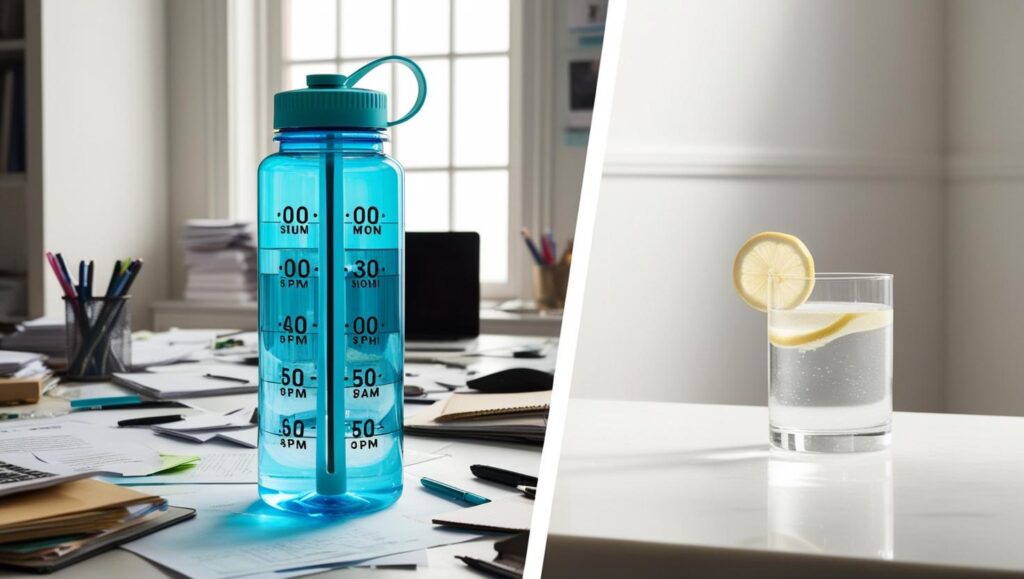
You’ve probably seen the giant water jugs with motivational quotes and hourly reminders. Maybe you’ve bought one yourself, hoping it would make drinking more water easier. But then reality kicks in: life gets busy, your schedule is unpredictable, and suddenly, you’re either forgetting to drink at all — or running to the bathroom every 30 minutes.
Let’s be honest — who has time to pee all day long?
Your Body Needs Hydration — But Not in Extreme Doses
The pressure to drink a gallon of water daily might not even be necessary for your body. Hydration isn’t just about quantity — it’s about balance. Overhydrating without replenishing electrolytes can sometimes leave you feeling lightheaded, bloated, or even more tired.
And if you’re someone who’s already juggling hormone fluctuations, digestion changes, or low energy, forcing excessive water intake could be adding more stress to your system — not less.
Focus on Smarter, Not More
Instead of stressing over hitting a certain number of ounces, try paying attention to the quality of your hydration. A good rule of thumb? Start your day with water (especially after coffee), drink throughout meals, and keep a bottle nearby — but don’t panic if you’re not finishing a jug by bedtime.
Also, consider adding electrolyte drinks into your routine — especially on days when you’re sweating, working outside, or just feeling depleted. Sugar-free options like LMNT or low-sugar hydration mixes can help you absorb water more efficiently and keep your energy stable.
This is especially helpful if you’re not a natural water drinker or just forget throughout the day. Sometimes, a bit of flavor or function can go a long way in helping you stay hydrated without pressure.
Give Yourself Permission to Relax
The goal is hydration that supports your body — not a new rule that makes you feel like you’re failing. Listen to your thirst cues, drink when your body asks for it, and let go of the guilt if you don’t hit a specific number.
After 40, wellness should feel lighter, not more demanding. Hydration is important, yes — but it shouldn’t feel like a full-time job.
5. Cutting Out Entire Food Groups
The All-or-Nothing Mindset Doesn’t Work Long-Term
You’ve probably heard it all before: “No carbs.” “No sugar.” “No dairy.” “No gluten.” The wellness world loves extremes — and it’s easy to fall into the trap of thinking that cutting out entire food groups is the key to feeling better. But for most women over 40, these rigid rules often lead to more stress, more cravings, and more frustration.
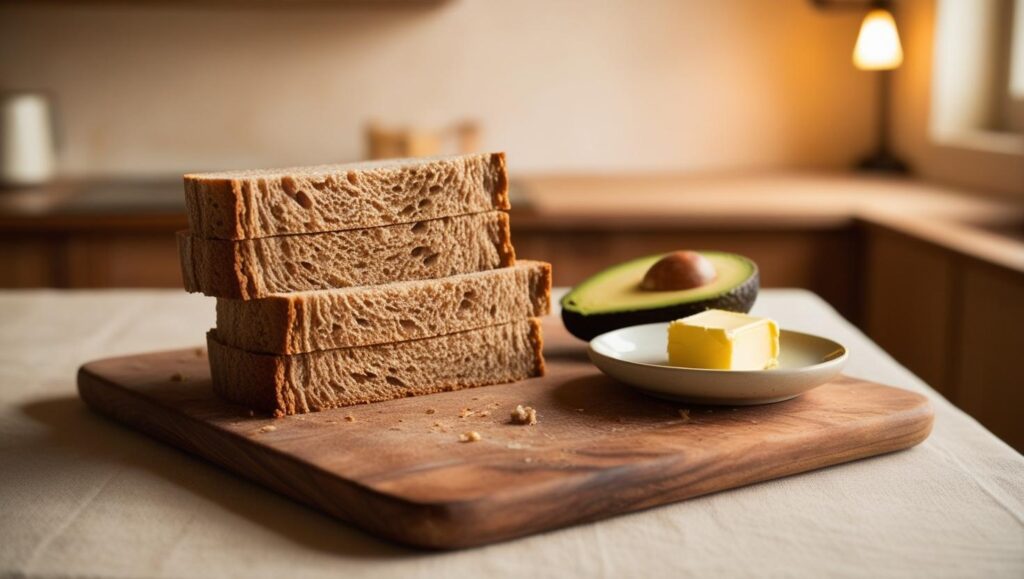
Yes, some people genuinely feel better avoiding certain ingredients — especially if there’s a diagnosed allergy or sensitivity. But most of the time, cutting out whole food groups is driven by fear, not facts. And what starts as a healthy intention can quickly spiral into guilt, binge cycles, or nutrient imbalances.
Your Body Needs Nourishment, Not Restriction
At this stage of life, your body doesn’t want to be punished. It wants to be supported. Cutting out carbs, for example, can mess with your energy, your mood, and even your hormones — especially if you’re already navigating perimenopause or menopause. Skipping healthy fats can impact brain function and skin health. And going too low on natural sugars or whole grains can affect digestion and gut balance.
Instead of removing everything, try focusing on quality. Whole grains instead of ultra-processed ones. Natural sugars from fruit instead of added sugar from packaged snacks. Balanced meals that include protein, fiber, and healthy fats — not just one or two food groups at a time.
Bread Lovers, You’re Not Alone
For many women, bread is the first thing to go. But here’s the thing — not all bread is the same. Store-bought, shelf-stable loaves often contain preservatives and added sugars that do make you feel bloated and sluggish. But making your own bread at home — even if it’s not sourdough — can be gentler on your gut and much more satisfying.
The same goes for pasta, rice, and even the occasional dessert. When you make space for real, intentional meals, you’re much less likely to feel out of control or deprived.
Focus on Awareness, Not Elimination
Instead of banning certain foods completely, try noticing how they make you feel. Some meals will energize you. Others might leave you tired or heavy. That’s valuable information. Use it to guide your choices, not restrict them.
Because at the end of the day, food is not just fuel — it’s also comfort, culture, connection, and joy. And at this point in life, you deserve to enjoy your meals and feel good afterward.
It’s not about being perfect. It’s about being kind to your body — and letting go of the extremes that don’t serve you anymore.
6. Tracking Every Calorie or Macro
When Healthy Turns Into Obsessive
There’s nothing wrong with being aware of what you’re eating. But when food turns into math — grams, points, percentages, logs, apps — it can quickly become exhausting. What starts as a desire to “stay on track” can quietly turn into an obsession that steals your peace.
For women over 40, this kind of hyper-control can be especially draining. Hormonal changes already affect how your body holds onto weight, how hungry you feel, and how you process certain foods. Add calorie-counting to the mix, and you’re not just managing meals — you’re managing stress.

You might start to feel like you’re constantly thinking about food. What you just ate. What you’ll eat next. If you “went over.” If you “earned dessert.” It becomes a mental loop — and ironically, that loop can lead to emotional eating, restriction, or burnout.
A Better Way to Stay Mindful
Letting go of calorie and macro tracking doesn’t mean letting go of healthy habits. It just means shifting your focus from numbers to nourishment. Instead of obsessing over exact amounts, try looking at your meals in terms of balance.
Did you get enough protein to support your energy and muscles?
Did you include fiber for digestion and fullness?
Did you eat something that actually satisfied you — not just fit into an app?
These are the questions that matter more than “Was this 1,800 calories or 2,000?” Especially in your 40s, when energy, hormone health, and digestion become more central than a number on the scale.
Focus on How Food Makes You Feel
A meal that leaves you satisfied, energized, and stable is a win. A snack that keeps you from crashing or craving sugar is a win. A treat that you actually enjoyed without guilt? That’s a win, too.
Start paying attention to how different meals and foods make you feel afterward. Do they fuel you or drain you? Do they leave you bloated or balanced? This kind of awareness builds a healthy relationship with food — one that’s based on trust, not control.
Food Is Not a Math Problem
Your body is not a calculator. You are not meant to live in restriction or punishment. At this stage of life, you’ve earned the right to enjoy your meals, move with intention, and rest when you need it — without logging every bite.
So if tracking feels like a job you never signed up for, it’s okay to quit. You can eat well, feel well, and live well — without a spreadsheet.
7. Following Every New Wellness Trend
The Constant Chase That Never Ends
Every week there’s a new superfood, supplement, tea, cleanse, or gadget being promoted as the next big solution. You see it online, hear about it from friends, maybe even feel the pull to order it late at night because “what if this is the thing that finally works?”
But constantly chasing trends can leave you feeling more overwhelmed than empowered — especially in your 40s, when your body is changing and your energy is too precious to waste on quick fixes.
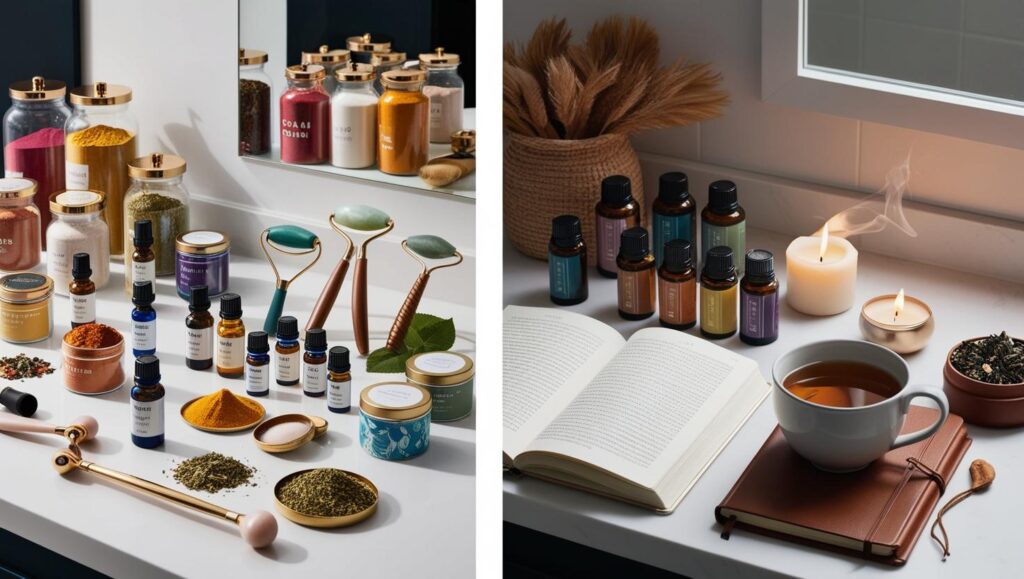
Trying every trending wellness habit isn’t just expensive — it’s exhausting. One week it’s seed cycling, the next it’s infrared saunas, then it’s adaptogens you can’t pronounce. Before you know it, your cabinets are full, your wallet is lighter, and your routine is so overloaded that nothing actually sticks.
What Works Isn’t Always What’s Popular
Here’s the truth: the habits that actually support your long-term health often aren’t flashy. They’re not viral. They’re not hyped up by influencers. They’re simple, grounded, and consistent.
Things like walking. Sleeping well. Eating balanced meals. Managing stress. Drinking enough water. Laughing more. Saying no. These things don’t trend — but they work.
Trendy doesn’t mean effective. And just because something worked for someone online doesn’t mean it’s right for your body, your schedule, or your season of life.
Find What Feels Right for You
You don’t need to try every new thing to be healthy. In fact, narrowing your focus and sticking with a few habits that genuinely feel good is often the most healing approach of all.
If you’ve found something that helps you feel more grounded, more energized, or more in tune with your body — hold onto it. Let that be your anchor. Then let the rest go.
Trends will come and go. But your wellness isn’t a trend. It’s your life. And it deserves care, not chaos.
Wellness Doesn’t Have to Be Complicated
At the end of the day, the most powerful shift you can make in your 40s is this: stop chasing, start listening. Listen to your body. Listen to your gut. Listen to your energy. You already have the wisdom you need to feel better — not from something new, but from reconnecting to what’s real.
You don’t need more. You just need what works — and what lasts.
Health That Feels Like Home
If you’ve ever felt like you were doing everything “right” and still not getting the results you hoped for — tired, bloated, frustrated — you’re not alone. And you’re not doing it wrong.
You’re simply in a new season of life. One where your body is asking for less noise and more nourishment. Less pressure and more peace. Less perfection and more presence.

The truth is, many wellness trends were never made with women in their 40s in mind. They were made to sell something. And you’ve outgrown that cycle. You no longer need to hustle for health — you need habits that feel like support, not punishment.
When you let go of the trends that aren’t serving you — and start listening to what your body actually needs — everything shifts. Your energy starts to return. Your digestion calms. Your relationship with food softens. And most importantly, you feel like yourself again.
This isn’t about giving up. It’s about coming home to your body with more wisdom than ever before.
You don’t need to do more. You need to do what matters — consistently, gently, and with love.
Tell Me in the Comments:
Which habit are you ready to let go of first?
Are there any trends you’ve already quit that made a difference for you?
Let’s build a more peaceful wellness path together — one grounded in clarity, not chaos. 💛



One Comment
Comments are closed.